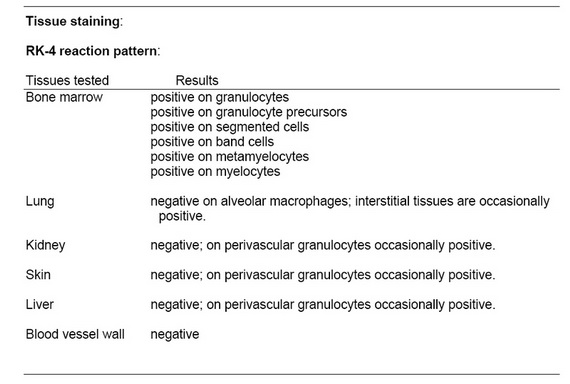Granulocytes (pan, surface antigen) Mouse Monoclonal Antibody [Clone ID: RK-4]
CAT#: BM4012B
Granulocytes (pan, surface antigen) mouse monoclonal antibody, clone RK-4, Biotin
Specifications
| Product Data | |
| Clone Name | RK-4 |
| Applications | Assay, FC, IHC |
| Recommended Dilution | Flow Cytometry: 1/50-1/100. Immunohistochemistry on Frozen Sections: 0.75 µg/ml (1/400), Immunohistochemistry on Paraffin Sections (After enzyme digestion). Suggested Positive Control: Rat spleen, blood smears. Has been described to work in FACS. |
| Reactivities | Rat |
| Host | Mouse |
| Isotype | IgG1 |
| Clonality | Monoclonal |
| Immunogen | Peritoneal cells. |
| Specificity | This Monoclonal Antibody BM4012B RK-4 detects all Rat Granulocytes in Frozen, and in Paraffin Embedded Rat tissue sections after enzyme digestion. The antigen is localized on the cell surface. The epitope has not been further characterized. The molecular structure of the antigen is not known. It is localized on the cell surface and stable for paraffin embedding. Antigen Distribution On Isolated Cells: Only a low percentage of cells from peripheral blood stains positive. Positive on peritoneal cells 18h after thioglycollate injection (95% granulocytes). Negative on peritoneal cells 4 days after thioglycollate injection. Negative on isolated lymphocytes, monocytes,erythrocytes and platelets. See Table 1. for details. |
| Formulation | Stock Solution contains PBS, pH 7.2 with 0.01% Thimerosal as preservative and 10 mg/ml BSA as stabilizer Label: Biotin State: Lyophilized purified Ig fraction |
| Reconstitution Method | Restore with 0.5 ml distilled water. |
| Concentration | 0.3 mg/ml IgG (after reconstitution) |
| Purification | Affinity Chromatography |
| Conjugation | Biotin |
| Storage | Prior to reconstitution store at 2-8°C. |
| Stability | Shelf life: one year from despatch. |
| Background | Granulocytes are a type of white blood cell filled with microscopic granules that are little sacs containing enzymes, compounds that digest microorganisms. They are part of the innate immune system and have somewhat nonspecific, broad-based activity. They do not respond exclusively to specific antigens, as do B-cells and T-cells. Neutrophils, eosinophils and basophils are all types of granulocytes. They are named by the staining features of their granules in the laboratory: Neutrophils have "neutral" subtle granules; Eosinophils have prominent granules that stain readily with the acid dye eosin; and Basophils have prominent granules that stain readily basic (non acidic) dyes. |
| Synonyms | Granulocyte cells |
| Reference Data | |
Documents
| Product Manuals |
| FAQs |
{0} Product Review(s)
0 Product Review(s)
Submit review
Be the first one to submit a review
Product Citations
*Delivery time may vary from web posted schedule. Occasional delays may occur due to unforeseen
complexities in the preparation of your product. International customers may expect an additional 1-2 weeks
in shipping.






























































































































































































































































 Germany
Germany
 Japan
Japan
 United Kingdom
United Kingdom
 China
China



